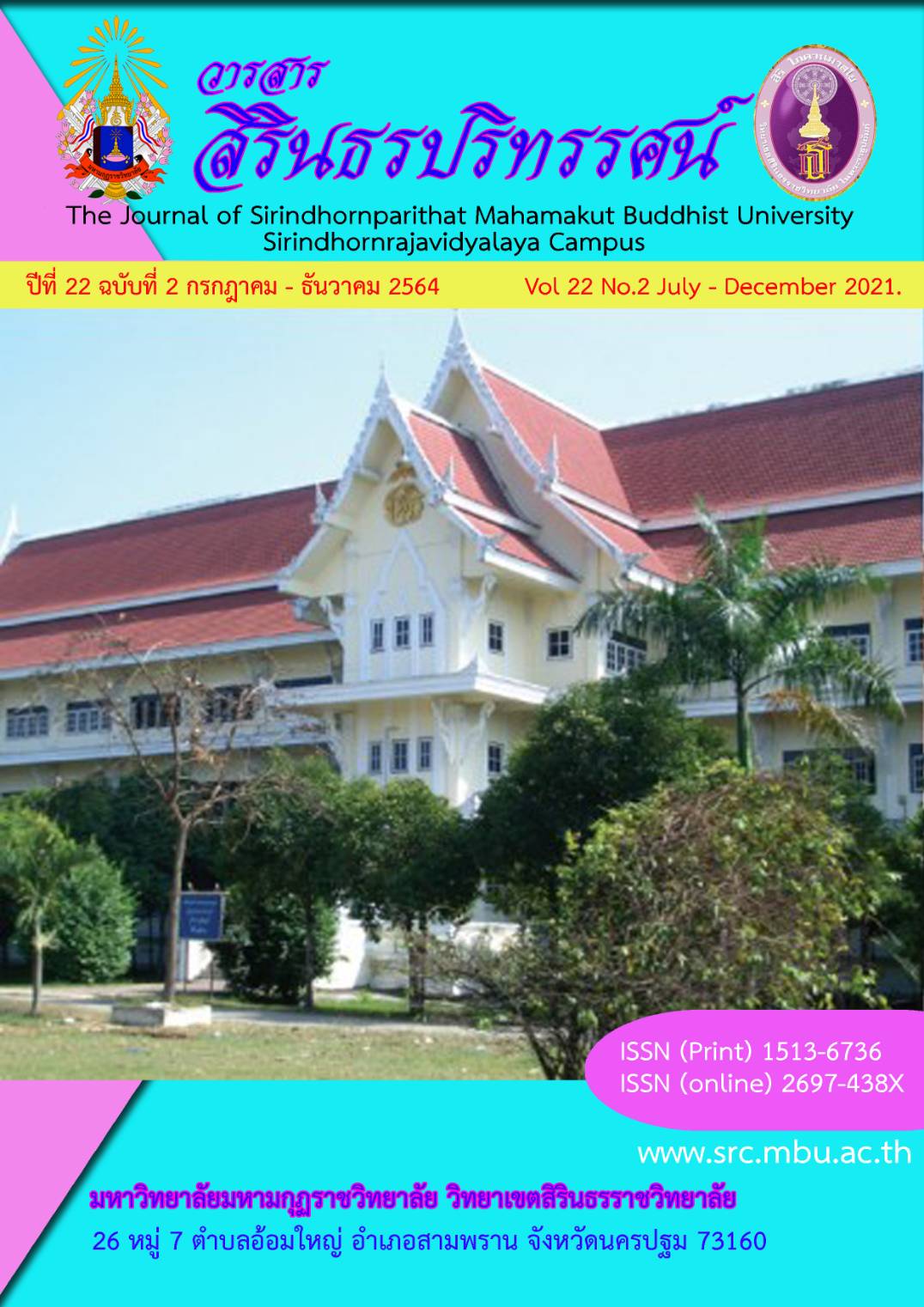From Slate to Digital, What ‘s the Learners Received?
Keywords:
Slate, Digital, StudentAbstract
The educational management develop the quality of children and youth in Thailand. Which considered is a systematic education management. There is a national agency responsible for the education system. Since the announcement of the establishment of the department of education in the reign of King Rama 5. Therefore Thai education has been over 130 years. The important equipment of students used from the past to the present can be divided into 3 types. It begins with students using a slate as a device. Later it was the era of writing on the notebook. And now the students using recording knowledge on technological devices in the digital age. The first two types of devices are mainly used for acquiring knowledge from teachers but in the digital age, students' devices are used as a source of extremely high quality knowledge. The equipment of student has changed but what the students get from the teacher how much has changed? How much do teachers give students? How useful is it? The value of what students have been given. It should be co-analysis, which will be of benefit to current and future students. It's something that teachers and learners need to do together to make this happen. The teaching and learning approach to meets the interests and needs of the students. The learning of the future is the students learn what meets their potential and needs. They can be used in life, either in a way of applying it or that the students can adjust appropriately to benefit as required with a process that arises from the received knowledge.
References
ฉันทนา วิริยเวชกุล. (2558). เทคนิคการสอนสำหรับครู. กรุงเทพฯ: แห่งจุฬาลงกรณ์มหาวิทยาลัย.
นิวัตต์ น้อยมณี และ กัญภร เอี่ยมพญา. (2560). จิตวิญญาณครู. พิมพ์ครั้งที่ 2. นนทบุรี: 21 เซ็นจูรี่.
พระครูศรีปริยัติคุณาภรณ์, สมเกียรติ ไชยภูมิ, ทองใบ ธรานันทางกูร, พระวิเชียร แสนศรี และ กรุณา มธุลาภรังสรรค์. (2563). การประเมินผลการเสริมสร้างคุณค่าประเทศไทย 4.0 ด้วยพุทธธรรมนิยม เพื่อทำให้ สังคมไทย 4.0 มีความมั่งคั่ง มั่นคง และยั่งยืนอย่างแท้จริง. วารสารสิรินธรปริทรรศน์. 21(2) : 122-133.
พระครูสิริธรรมนิเทศ, พระครูวิภัชธรรมวิจิตร และ จักรี บางประเสริฐ. (2563). การจัดการชั้นเรียนในยุคการศึกษาเปลี่ยนแปลง. วารสารสิรินธรปริทรรศน์. 21(2) : 208-216.
พิมพันธ์ เดชะคุปต์ และ พเยาว์ ยินดีสุข. (2557). การจัดการเรียนรู้ในศตวรรษที่ 21. กรุงเทพฯ: สำนักพิมพ์แห่งจุฬาลงกรณ์มหาวิทยาลัย.
ไพฑูรย์ สินลารัตน์ และ นักรบ หมี้แสน. (2560). ความเป็นครูและการพัฒนาครูมืออาชีพ. กรุงเทพฯ: สำนักพิมพ์แห่งจุฬาลงกรณ์มหาวิทยาลัย
ไพล อินทรเดช. (2560). ประวัติกระดานชนวนไทยสมัยโบราณ. [ออนไลน์]. สืบค้นเมื่อ 15 กุมภาพันธ์ 2564. จาก https://www.facebook.com/LMClab1/posts/229854814212970/.
ราชกิจจานุเบกษา. (2554). พระราชบัญญัติ เงินเดือน เงินวิทยฐานะ และเงินประจำตำแหน่งข้าราชการครูและบุคลากรทางการศึกษา (ฉบับที่ 2) พ.ศ. 2554. เล่ม 128 ตอนที่ 21ก วันที่ 30 มีนาคม 2554.
ราชกิจจานุเบกษา. (2554). พระราชบัญญัติ เงินเดือน เงินวิทยฐานะ และเงินประจำตำแหน่งข้าราชการครูและบุคลากรทางการศึกษา (ฉบับที่ 2) พ.ศ. 2554. เล่ม 128 ตอนที่ 21ก วันที่ 30 มีนาคม 2554.
ราชบัณฑิตยสถาน. (2556). พจนานุกรม ฉบับราชบัณฑิตยสถาน พ.ศ. 2554. พิมพ์ครั้งที่ 2. กรุงเทพฯ: บริษัท ศิริวัฒนา อินเตอร์พริ้นท์ จำกัด (มหาชน).
วิจารณ์ พานิช. (2559). บันเทิงชีวิตครูสู่ชุมชนการเรียนรู้. กรุงเทพฯ: มูลนิธิสยามกัมมาจล.
สํานักงานเลขาธิการสภาการศึกษา. (2563). กฎหมายว่าด้วยการศึกษาแห่งชาติ กฎหมายว่าด้วยระเบียบบริหารราชการกระทรวงศึกษาธิการ กฎหมายว่าด้วยระเบียบข้าราชการครูและบุคลากรทางการศึกษา. กรุงเทพฯ: อีเลฟเว่น สตาร์ อินเตอร์เทรด.
อนุวัฒน ธัมมะปาละ, เสวียน เจนเขว้า และ เสาวภาคย์ หลมเพ็ชร. (2561). แนวทางการบริหารงานวิชาการในกลุ่มโรงเรียนวังชลสินธุ์ สังกัดสำนักงานเขตพื้นที่การศึกษาประถมศึกษาพระนครศรีอยุธยา เขต 1. วารสารสิรินธรปริทรรศน์. 19(1) : 75-81.
อาจอง ชุมสาย ณ อยุธยา. (2553). คุณธรรมนำความรู้. ฉบับปรับปรุงใหม่. กรุงเทพฯ: เอ.พี.กราฟฟิคดีไซด์ และการพิมพ์
Downloads
Published
Issue
Section
License
Copyright (c) 2022 Mahamakut Buddhist University

This work is licensed under a Creative Commons Attribution-NonCommercial-NoDerivatives 4.0 International License.
บทความที่ได้รับการตีพิมพ์เป็นลิขสิทธิ์ของ มหาวิทยาลัยมหามกุฏราชวิทยาลัย วิทยาเขตสิรินธรราชวิทยาลัย
ข้อความที่ปรากฏในบทความแต่ละเรื่องในวารสารวิชาการเล่มนี้เป็นความคิดเห็นส่วนตัวของผู้เขียนแต่ละท่านไม่เกี่ยวข้องกับหาวิทยาลัยมหามกุฏราชวิทยาลัย วิทยาเขตสิรินธรราชวิทยาลัย และคณาจารย์ท่านอื่นๆในมหาวิทยาลัยฯ แต่อย่างใด ความรับผิดชอบองค์ประกอบทั้งหมดของบทความแต่ละเรื่องเป็นของผู้เขียนแต่ละท่าน หากมีความผิดพลาดใดๆ ผู้เขียนแต่ละท่านจะรับผิดชอบบทความของตนเองแต่ผู้เดียว




